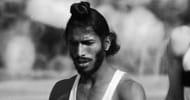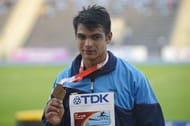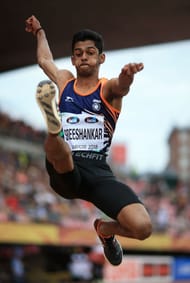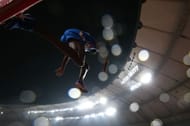The Tokyo Olympics are all set to begin on July 23. Delayed by a year due to the COVID-19 pandemic, the International Olympic Committee is all set to conduct the Games, even if it means not having an audience.
This event will be an acid test for India. Can they break the double-digit barrier when it comes to Olympic medals?
The Tokyo Olympics is the perfect opportunity for Indian athletes to make their mark. Ironically, the sport which gave India their first-ever Olympic medal is yet to see an independent Indian climb the podium for the same. Even more ironic is the fact that para-athletes have brought more medals in this discipline than any able-bodied athlete has ever managed to do so.
In Paris in 1900, Norman Pritchard, an Anglo-Indian athlete, won India's first and only medal in Olympic athletics. Since then, there have been many Indians who came agonizingly close to winning but were unable to climb the podium.
Be it Henry Rebello injuring his hamstring or Milkha Singh tragically slowing down at the crucial curve of 250m, India have had their fair share of letdowns. But the Tokyo Olympics is probably the best opportunity in years to put an end to that mess.
As of now, the following Indians have made the cut for athletics at the Tokyo Olympics:
1) Sandeep Kumar - Men's 20 km racewalk
2) Rahul Rohilla - Men's 20 km racewalk
3) Irfan Kolothum Thodi - Men's 20 km racewalk
4) Priyanka Goswami - Women's 20 km racewalk
5) Bhawna Jat - Women's 20 km racewalk
6) Avinash Sable - Men's 3000 m steeplechase
7) Indian Mixed 4x400 m. relay team
8) Naib Subedar Neeraj Chopra - Men's javelin throw
9) Shivpal Singh - Men's javelin throw
10) Murali Shreeshankar - Men's long jump
11) Kamalpreet Kaur - Women's Discus Throw
Could the Tokyo Olympics see an independent Indian's first medal in athletics?

Just like in archery at the Olympics, India's efforts at athletics have also been a curious case. Despite having some of the best athletes, no one from independent India has ever been able to clinch an Olympic medal. Even more ironic is the fact that the country's differently-abled athletes have won more medals than any able-bodied Indian has ever managed at the quadrennial event.
Also read: Tokyo Olympics 2021 Athletics: Schedule, venue, events and all you need to know
It all began with the 1948 London Olympics. Apart from the Indian hockey team carrying much of the country's hopes, there was Henry Rebello - a promising young athlete. His qualification mark was enough to put him on the right track for a historic individual medal, which would've been a first for an independent India. However, a torn hamstring ruled him out of the finals.
Indian athletics have since struggled to recover from that ominous first setback. There have been many occasions where they were tantalizingly close to winning an Olympic medal. However, bad luck denied them a chance to create history, and no one knows it better than the likes of Milkha Singh and PT Usha. Will we see the disappointment end at the Tokyo Olympics?
Naib Subedar Neeraj Chopra - India's biggest medal hope at theTokyo Olympics

Some athletes are not the best in the league to begin with but develop the capability to become such with time. One of them is Naib Subedar Neeraj Chopra. A tall, lanky athlete, Neeraj couldn't make it in time for the Rio Olympics. However, he broke the national record with an impressive throw of 86.48 at the World Junior Championships.
Not only was this a historic feat, but had he pulled it off at the Rio Olympics, it would have earned him a historic bronze as well. As of now, Neeraj Chopra is the Asian stalwart of the javelin throw, second only to the likes of Germans Johannes Vetter and Thomas Rohler. His best throw of 88.07m would have garnered him a historic gold medal at the World Championships in 2019.
The current Asian Champion only needs to keep cool. It has been an agonizing wait for him, forcefully extended by the second wave of COVID-19. However, if he gets his share of adequate warm-ups, Neeraj Chopra can achieve at the Tokyo Olympics what has been a long time coming for Indian athletics - a historic gold medal.
Irfan Kolothum Thodi and the racewalkers - India's dark horses at the Tokyo Olympics
![India's racewalkers - The Dark Horses [Representational Image]](https://staticg.sportskeeda.com/editor/2021/06/85a22-16228941581216-800.jpg?w=190)
Indian racewalkers also hold the potential to create history at the Tokyo Olympics. If they are given the best of training and get ample opportunities, they can end India's Olympic medal drought in athletics.
Racewalking is an extremely tough discipline in athletics. Due to a lack of proper training, India has never been able to make it big despite having huge potential. One of the best examples is that of Zora Singh. At the 50km race walk event at the Rome Olympics in 1960, Singh was leading for almost 15 kilometers. However, he couldn't sustain his lead long enough and finished a disappointing but respectable eighth.
Likewise, the current batch of racewalkers just needs a bit of extra support from the Indian spectators. One of them, Irfan Kolothum Thodi, had set a national record in the men's 20km racewalk. Despite finishing 10th, he set a new national record at the London Olympics in 2012. He even finished an agonizing fifth in the IAAF Racewalking Challenge in 2013.
If the racewalkers set their eyes on the goal and receive the right support, nothing can stop them from a momentous achievement at the Tokyo Olympics.
Can Murali Sreeshankar do at the Tokyo Olympics what Anju Bobby George could not?

Another medal hopeful from India is long jumper Murali Sreeshankar. He recently broke India's national record in the sport with a leap of 8.26 meters.
Long jump isn't exactly India's forte. However, the long jumper from Kerala can make it count at the Tokyo Olympics. Had he jumped the same height at the Rio Olympics, he would've missed a historic bronze by just three centimeters. Going beyond the 8.3-meter mark could guarantee him a Tokyo Olympics medal.
The last time any Indian attempted to make it count in the long jump was Anju Bobby George. She is the first-ever Indian to win a medal at the World Athletics Championships. Anju also made it to the finals of the Athens Olympics the very next year in 2003. However, she finished an agonizing fifth despite breaking the national record.
So can Murali Sreeshankar do what Anju Bobby George could not? He may well, since he is in peak form right now. India will be hoping he gives his best at the Tokyo Olympics and brings back a historic medal.
Avinash Kumar Sable - India's Tokyo Olympics trump card

Avinash Sable, a proud soldier from the Indian Army, could turn out to be India's trump card at the Tokyo Olympics.
In 2019, Avinash tripped twice and was unable to make it to the finals. However, a successful appeal from the Athletics Federation of India allowed him to make it - a first for any Indian in this category. Though he finished a disappointing 13th, his timing of eight minutes and 21.37 seconds helped him break his national record set in the preliminaries.
Avinash has once again broken his national record, which now gives him a realistic chance of vying for the podium. He is almost 27 years old, which means he still has a lot of years ahead of him, and can give it his best. If he manages to breach the eight-minute-10-second barrier, he could very well be in contention for a historic medal.
While it's only a matter of time as to whose medal hopes are finally converted into reality, India will be hoping one of their athletes finally creates a legacy of its own at the Tokyo Olympics.
